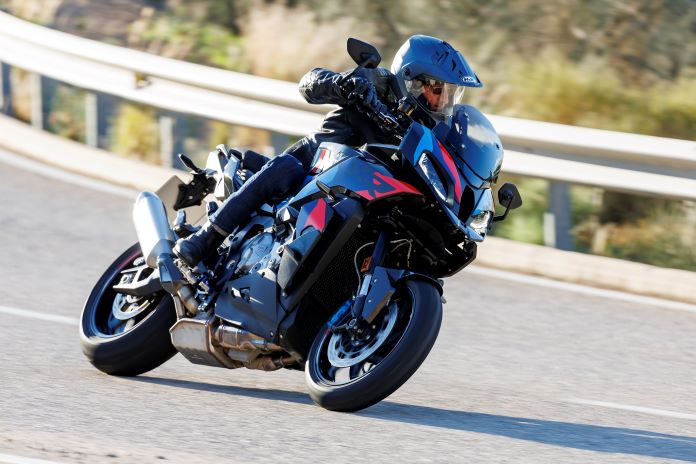
BMW’s lineup of streetbikes is amazingly diverse, from single-cylinder roadsters all the way up to the supersized R 18 series, so there’s a Beemer for almost anyone. BMW’s all-conquering GS series attracts most of the headlines, but there’s another gem often hidden in the shadows.
The S 1000 XR was one of the first sporty adventure-tourers on the market, eschewing off-road capability for street performance but with a longer-travel suspension than typical sportbikes. Introduced in 2015, the partially faired XR was based on the S 1000 R roadster using the mighty 999cc inline-Four from the S 1000 RR superbike.
Related: 2020 BMW S 1000 XR | Tour Test Review
Related: 2023 BMW S 1000 RR and M 1000 R | First Ride Review
BMW described the XR as an “Adventure Sport Bike,” while we see it as a high-performance sport-touring bike. Whatever term you prefer, the XR has been an outrageously fast way to carve up interstate maps with squiggly lines.
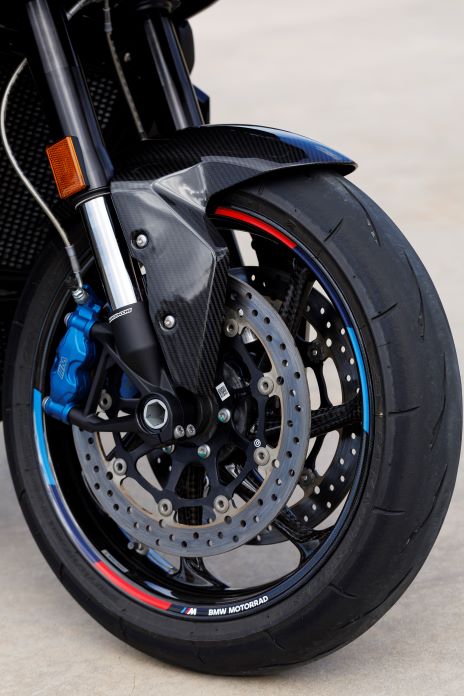
But when it comes to performance, there’s always a slice of the market that desires the utmost in speed, which is where this new M 1000 XR comes in. Boasting a seriously stout 201 hp, the M version of the XR takes the adventure sportbike theme to a stratospheric level.
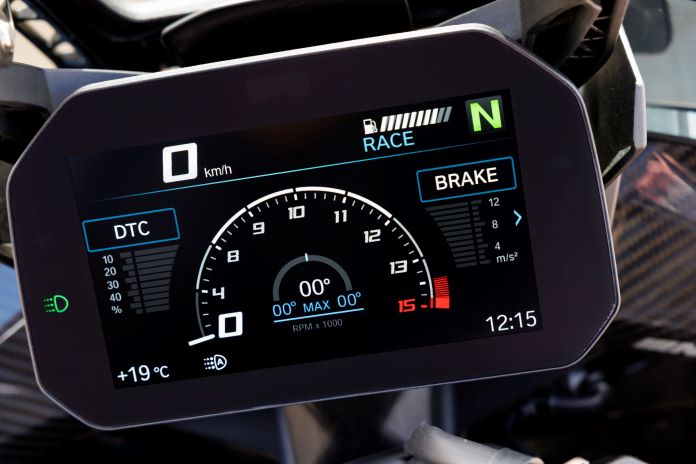
“It’s like a racebike with benefits of a crossover,” BMW proclaimed at the M 1000 XR’s recent launch in Spain. Motorrad reps say it’s the lightest and most powerful crossover bike on the market, intended to rule the roost of bikes designed for long-distance high-performance.
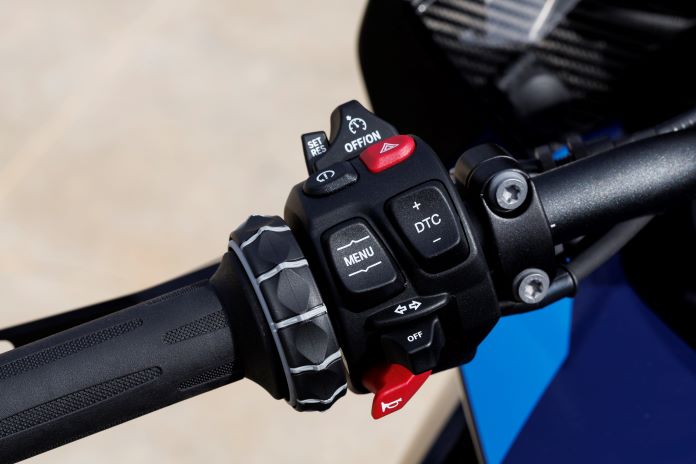
The S 1000 XR was also updated for 2024, gaining 5 hp to 170 ponies and now retailing for $18,190. But our focus was on the M version, the third M model from BMW Motorrad following the M 1000 RR superbike and the M 1000 R roadster. The S 1000 XR has a curb weight of 500 lb, 8 lb more than the M-XR.
Related: 2023 BMW S 1000 RR and M 1000 R | First Ride Review
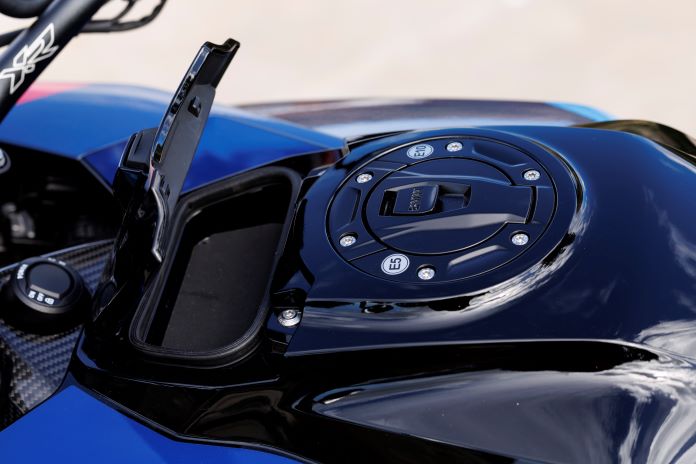
Design | BMW M 1000 XR
The XR still has a vestigial beak at its nose like ADVs do, but that’s as close to an adventure bike as the XR gets. Instead of a big schnoz masquerading as a front fender, the M 1000 XR has MotoGP-like winglets along the sides of its fairing.
BMW says the wings generate 41 lb of downforce at the M-XR’s 171-mph top speed, dropping to 25 lb at 137 mph. Probably a negligible amount at highway speeds, but the wings could be helpful at trackdays, which are part of the XR’s design brief.
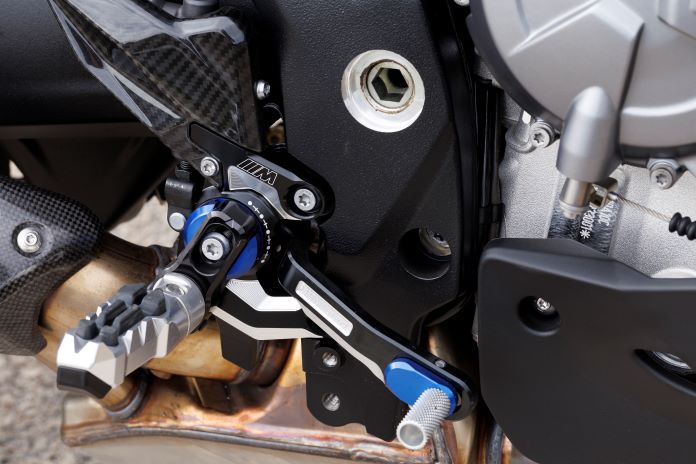
The bike’s twin-beam aluminum frame remains unchanged, but the powerplant bolted to it has undergone serious hot-rodding based on the M 1000 RR’s mill. BMW’s ShiftCam technology accomplishes the magical feat of maintaining optimal power at lower engine speeds while significantly boosting top-end output.
Below 9,000 rpm, the motor is directed by camshaft lobes optimized for operating at lower revs. At higher revs, two electromechanical actuators switch the intake valves over to a hotter cam lobe (more lift and different timing) in just 10 milliseconds. The result is favorable torque in low- and medium-speed ranges along with significant gains in peak power.
Further aiding engine output are a set of variable-length intake ducts stolen from the M 1000 RR and M 1000 R, which switch to shorter ducts above 11,000 rpm. The redline takes a leap from the S 1000 XR’s 12,000 rpm to 14,600 rpm, a seriously high engine speed that is aided by lightweight titanium valves.
Of course, there is no such thing as an inexpensive 200-hp motorcycle. The M 1000 XR has a base price of $24,295, but it doesn’t have to stop there. Preface: Carbon-fiber wheels for a Ferrari 296GTB are a $33,748 option.
Ordering the M Competition package amps up the bike’s racy nature with a slathering of carbon-fiber trim, from a carbon ignition lock cover and cockpit trim to fenders, bodywork, and even a chain guard. The most expensive bits are the M Carbon wheels, which trim unsprung and inertial mass from the place where it makes the most difference on a motorcycle.
If you love carbon fiber (or buy Ferraris), the package’s $5,495 price might seem reasonable, and it also includes special billet footpegs, axle protectors, and a lap-timing GPS trigger. Curb weight gets shaved from 492 lb to 485.
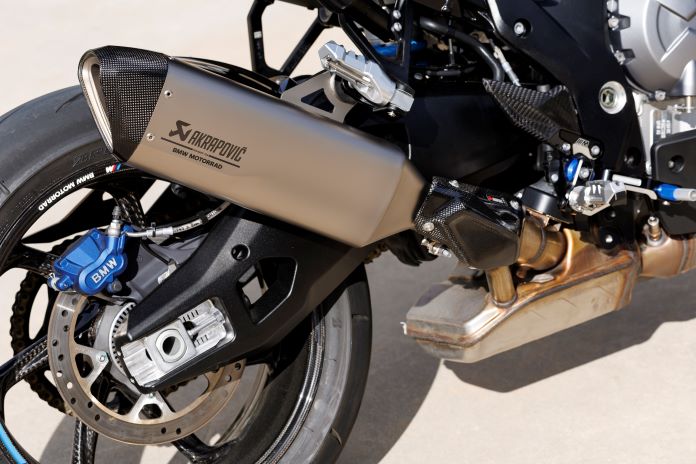
Comfortably Fast | BMW M 1000 XR
In front of our hotel in Spain was a lineup of M 1000 XRs in M Competition livery, a sinister black base peppered with blue and black accents. The overall look is visually arresting, even if it falls short of achieving pure aesthetic beauty.
Throwing over a leg, I was greeted by a relaxed riding position considering this bike’s performance potential. Despite its race-bred DNA, the M 1000 XR doesn’t compromise on rider comfort. The handlebar is within easy reach, and the M-branded seat feels plush. Front and center is a clearly readable 6.5-inch TFT display that can be connected to smartphones. The system’s complex capabilities are navigated by BMW’s innovative Multi-Controller wheel inboard of the left handgrip.
GEAR UP
- Helmet: HJC DS-X1
- Jacket: Alpinestars Hoxton V2
- Pants: Alpinestars Copper V2
- Gloves: Alpinestars GPX V2
- Boots: Alpinestars Soho
Firing up the XR, ears are greeted with a snarling exhaust note emitted by the tidy titanium Akrapovic muffler with a carbon cap. Most of the muffling takes place in a convoluted system of pipework placed under the engine. A quick blip of the throttle immediately sends revs soaring, a portent of fun times to follow.
Clutch pull is modest, and it barely needs to be bothered with thanks to a highly effective quickshifter that swaps cogs seamlessly. Despite the XR’s high-strung potential, it does a fine job of wading through city streets on the way out of town. Power is omnipresent no matter the engine speed, and the bike is easy to manage in tight spaces.
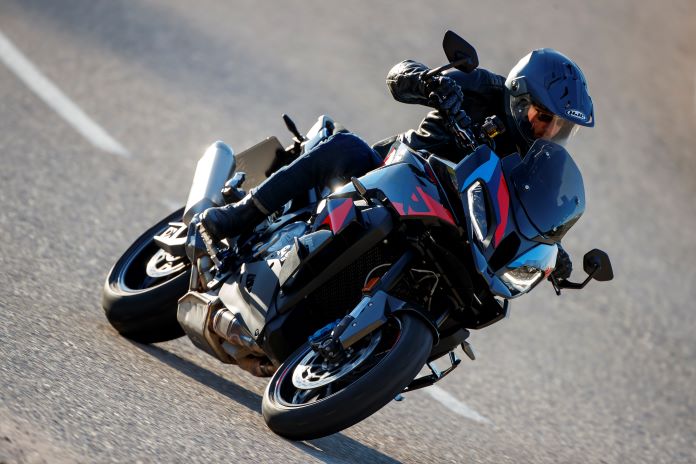
Next up was a highway stint that highlighted the XR’s comfort. The two-position windscreen is adjustable on the fly, and there’s a generous amount of space between the seat and the bars. The seat is fairly tall at 33.5 inches, which allows adequate legroom despite the high-set footpegs that enable dizzying lean angles without touching down. The M Competition foot controls also allow adjustments to fine-tune their fit for different riders.
In this environment, the “Road” ride mode delivers smooth throttle responses and a smooth ride from the semi-active suspension that has 5.4 inches of travel at both ends. Engine vibration is present but isn’t aggravating. Cruise control is standard equipment, and it operates flawlessly and can be set in 1-mph increments.
Ultimate Streetbike Performance | BMW M 1000 XR
After arriving in a rural area, the hilly, twisty roads ahead called for a different ride mode. I toggled to Dynamic, which sharpens the throttle responses and firms up suspension damping. Other modes available are Rain, Race, and three levels of Race Pro. I sampled the Race mode but eventually switched back to Dynamic, which suited me perfectly.
It was finally time to experience the power on tap from the M 1000 XR. Holy crap, this thing is fast! BMW says it can accelerate to 124 mph in just 7.4 seconds – that’s 1.3 seconds quicker than the S 1000 XR, partly due to the M’s shorter gearing. And if you’re brave enough to keep the throttle twisted past that speed, the acceleration forces barely diminish.
Fully up to the task of shedding big speeds are the M-XR’s brakes. I was initially disappointed to not see Brembo’s Stylema calipers, which are often found on premium bikes and are the best clampers I’ve tested. However, the XR’s monoblock Nissin calipers developed with BMW feel just as good as the vaunted Stylemas, with a firm lever and precise feedback. Very impressive!
The Dynamic Damping Control system transforms the suspension from touring-plush to sportbike-firm at the touch of a button. It takes cues from a 6-axis IMU to keep the bike settled regardless of how aggressively it’s ridden.
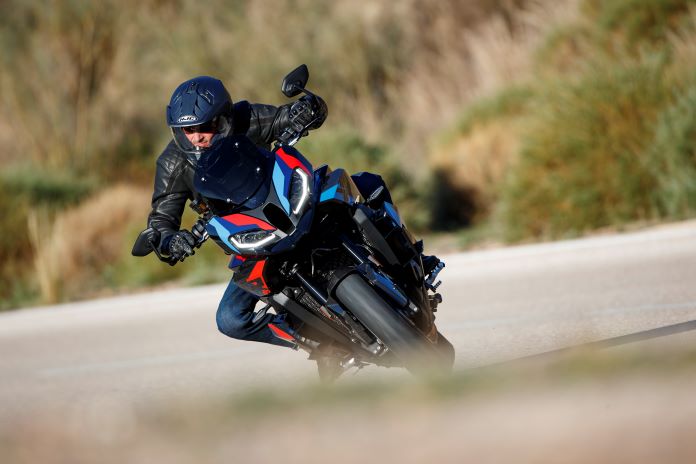
And the M 1000 XR thrives when ridden aggressively. Its relatively high and wide handlebar encourages quick steering transitions, which are certainly aided by the ultra-lightweight carbon wheels. Its agility is exceptional, and once levered over, the sportbike-derived chassis remains steadfast while the suspension’s DDC continually adjusts and adapts to every situation.
Indelible | BMW M 1000 XR
On the way back to the hotel, I reflected on a particular section of our ride. We were untangling a seemingly endless series of twists and turns interjected with occasional straight sections that enabled room to rev out the engine and seamlessly bang a few shifts. I was having so much fun that I was literally grinning and giggling in my helmet.
The M 1000 XR’s extreme performance and unflappable composure made me think I was on one of the best bikes in the world for twisty roads. Its glorious motor provides acceleration that will take your breath away, and you’d think it was terrific even if you never revved it above 9,000 rpm. The M-XR has agility that will shame many sportbikes, and it has race-level braking power backed by cornering ABS.
And when it’s time to leave the canyons, the M-XR transforms into a relatively comfy touring bike. Riders are coddled with decent wind protection, a plush suspension, and amenities like heated grips and cruise control.
Whether unraveling twisty mountain roads or devouring miles on the open highway, the M 1000 XR offers an unrivaled combination of performance, luxury, technological sophistication, and immaculate attention to detail. Now I just gotta remember where I stashed that $30K wad I was setting aside for something special…
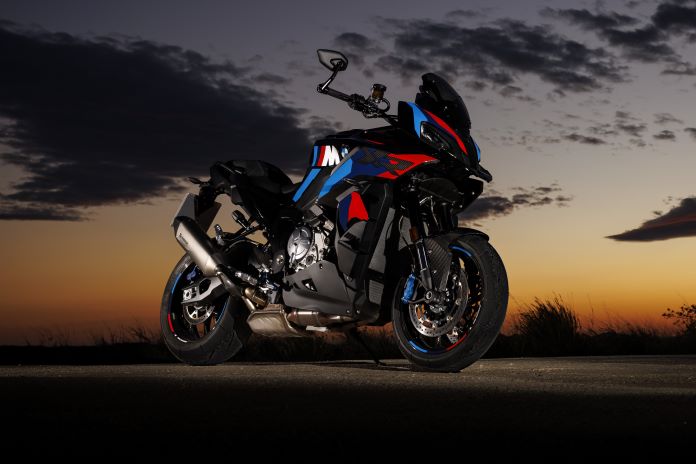
2024 BMW M 1000 XR Specs
- Base Price: $24,295
- Price As Tested: $30,485 (M Competition package)
- Warranty: 2 yrs., unltd. miles
- Website: BMWmotorcycles.com
ENGINE
- Type: Liquid-cooled, transverse inline-Four, DOHC w/ variable valve timing, 4 valves per cyl.
- Displacement: 999cc
- Bore x Stroke: 80.0 x 49.7.0mm
- Horsepower: 201 @ 12,750 rpm (factory claim)
- Torque: 83 lb-ft @ 11,000 rpm (factory claim)
- Compression Ratio: 13.3:1
- Valve Insp. Interval: 18,000 miles
- Fuel Delivery: EFI w/ throttle-by-wire, 48mm throttle bodies
- Transmission: 6-speed, cable-actuated slip/assist wet clutch
- Final Drive: Chain
CHASSIS
- Frame: Twin-beam aluminum, cast aluminum swingarm
- Wheelbase: 60.9 in.
- Rake/Trail: 25.1 degrees/4.6 in.
- Seat Height: 33.5 in.
- Suspension, Front: 45mm inverted fork, semi-active, 5.4 in. travel
- Rear: Single linkage shock,
adj. - Brakes, Front: Dual 320mm discs w/ 4-piston radial calipers & cornering ABS
- Rear: Single 265mm disc w/ 1-piston caliper & cornering ABS
- Wheels, Front: Carbon fiber, 3.5 x 17 (as tested)
- Rear: Carbon fiber, 6.0 x 17 (as tested)
- Tires, Front: 120/70-ZR17
- Rear: 200/55-ZR17
- Wet Weight: 492 lb (as tested, factory claim)
- Fuel Capacity: 5.3 gal.

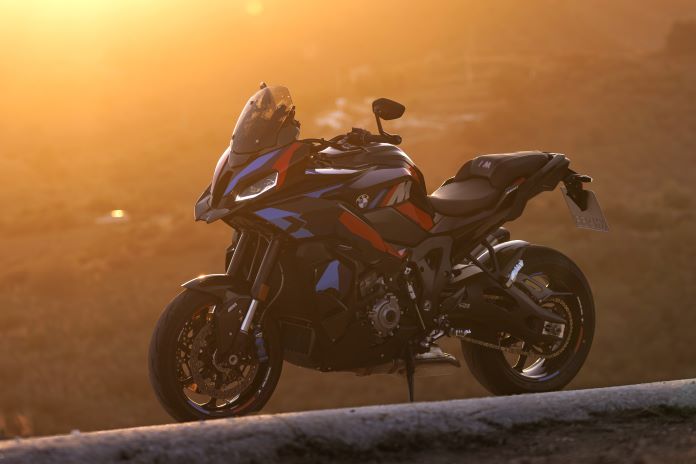
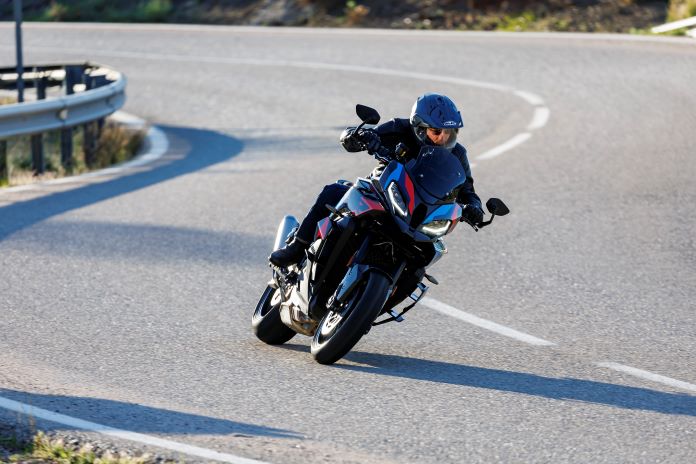
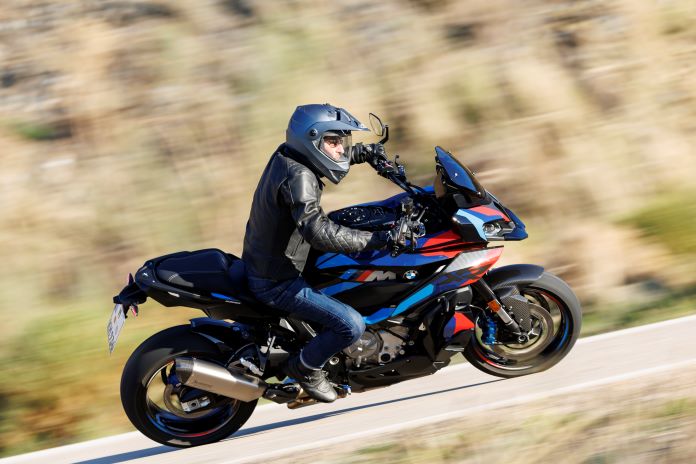
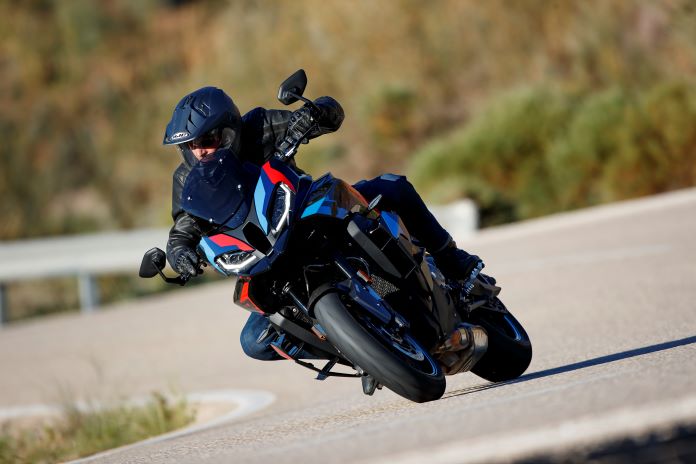
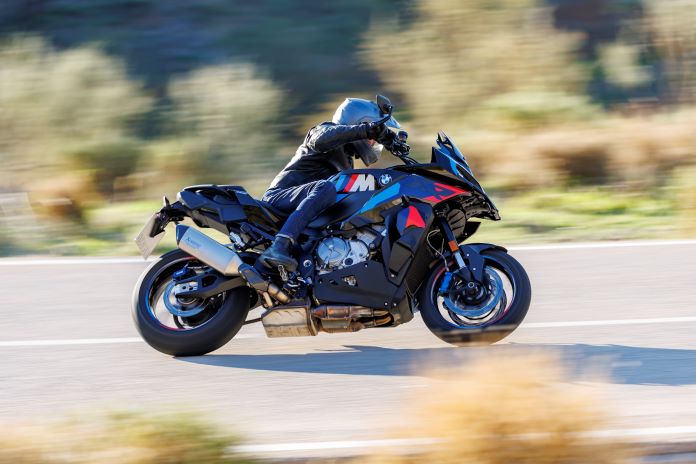
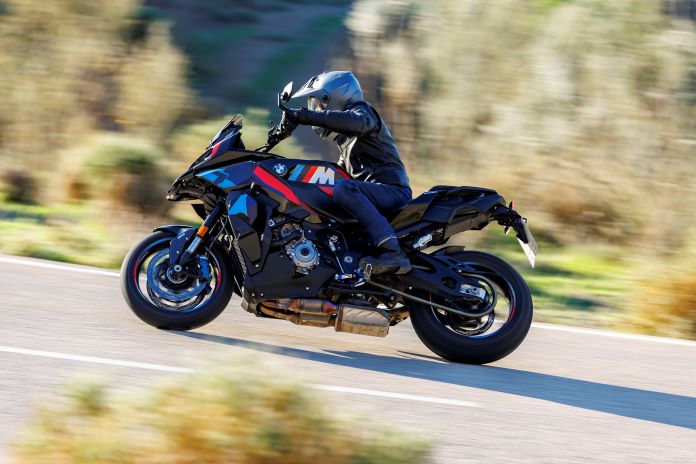
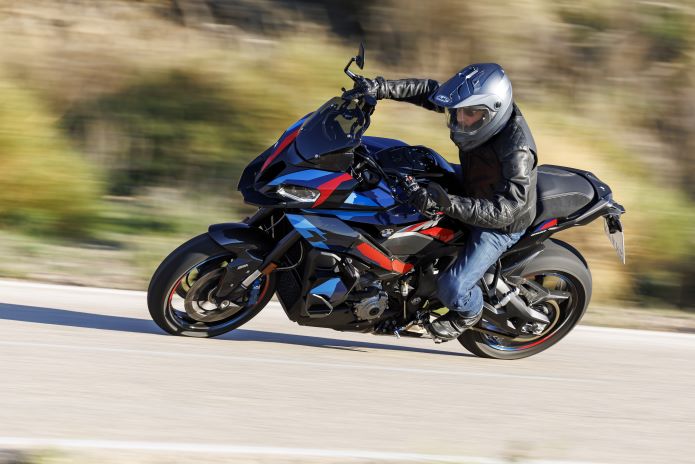
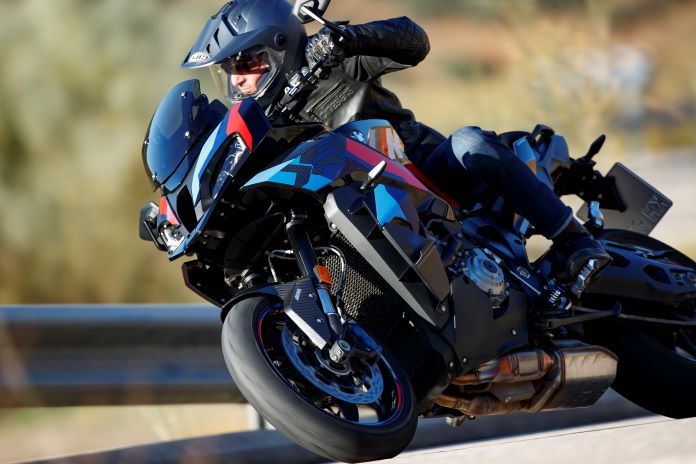


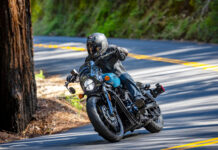




Finally a sport bike for our old sport bike abused bodies. Not whining about the price cause everything is getting spendy, but it cost’s as much as a nice used Lexus that an old guy like me would drive. I’ll keep my Versys 1K and early 80’s “Sport Bikes” aka GPZ, BMW R100S ect that dont have anti-fun button’s and a needed tech degree just to start it and pick up that used Lexus I’m lusting for in retirement.